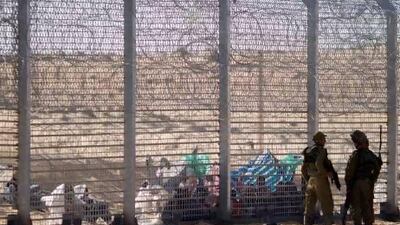JERUSALEM // Hundreds of African migrants are languishing in a desert detention centre in southern Israel, where families are allowed to meet just once a week and where women and children sleep in a prison-like compound, according to several Israeli parliamentarians.
A parliamentary delegation this week visited the Sahronim centre, which plays a key role in Israel's attempt to stem the flow of thousands of African migrants who have crossed the long desert border with Egypt in recent years.
"It's not a camp. It's a prison," said Michael Rozin, a member of parliament with the opposition dovish Meretz party. "You have guards. You are not free to do what you want. These people are not criminals. Their crime is asking for a better life."
Israel is a magnet for asylum seekers and economic migrants.
Most of the 55,000 African migrants who made it to Israel over the past decade claim they were escaping forced, open-ended conscription in Eritrea or war in Sudan.
Critics counter that most are job seekers attracted to Israel's wealthy economy and plentiful jobs as cleaners or in hotels and restaurants.
As their numbers have swelled, the perception has risen that they are a threat to Israel's Jewish character. Most of those that have made it out of the camps live in Tel Aviv slums, while their legal status remains in limbo. The government is trying to expel some and find alternative refuge for others.
Over the past year, Israel mostly halted the influx with a fence along the Egyptian border.
Those who have trickled in since, about 1,600, have been sent to Sahronim in the Negev desert, an hour's drive from the city of Beersheba.
Israeli authorities said a detention facility discouraged migrants by denying them a livelihood and claimed that conditions at Sahronim are adequate.
"There is no doubt one of the reasons we had such a flow of illegal economic migrants into Israel was because the economy was such a magnet," said an Israeli government spokesman, Mark Regev. "It was important for us to deal with that magnet."
Mr Rozin said detaining migrants in prison-style facilities is inhumane, even though, he and other advocates said, they are not mistreated and receive adequate medical care and food.
Prison authorities allow few visitors and reporters are banned. Members of parliament are allowed to request visits.
Many of the 1,400 men live in tents that hold 10 or more each. Fences separate them from the 200 women and 11 children housed in a low-slung building around a courtyard.
Families are allowed to meet only on Thursdays for several hours, though they can request more time.
Another section holds migrants who are convicted felons or who are suspected of committing a felony, Mr Rozin said.
The children have a kindergarten and adults may take courses, she said. They are counted every day by guards and barred from leaving, which perpetuates the sense of imprisonment, he said.
A woman who was released to a shelter in February after eight months in Sahronim described a bleak existence in the camp.
"The cells have steel doors," the woman told the advocacy group, Hotline for Migrant Workers.
She said women slept 10 to a room in bunk beds. "Sometimes in the morning a little light comes in, but one cannot feel the sun."
A video smuggled out of Sahronim by a member of the delegation this week and given to Israeli media showed men standing behind fences.
"Prison, prison, prison, all the time," said one man who claimed he had been there for 15 months.
Another woman said her children had nothing to do beyond two hours of daily activity.
Sigal Rozen of the Hotline for Migrant Workers said only 136 people have left Sahronim since last year.
Women who have been identified as trafficking victims are sent to shelters. Egyptian smugglers often torture or rape women on their journeys.
African migrants designated as refugees may be released but advocates said Israel had dragged its feet on thousands of refugee applications. There had been rulings on just 17 cases - all were rejected.
Israel cannot deport Eritreans, who make up the bulk of African migrants, because they risk persecution by their government. They can be held for up to three years but some have left following court petitions, Ms Rozen said.
It also doesn't deport Sudanese migrants because Sudan is an enemy state. Advocates said Sudanese migrants are expected to stay in Sahronim or go to another country.

